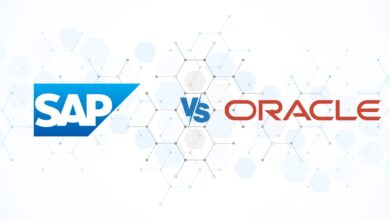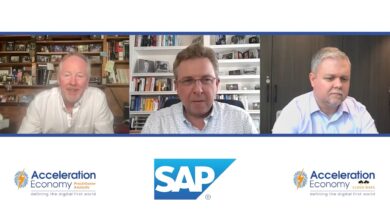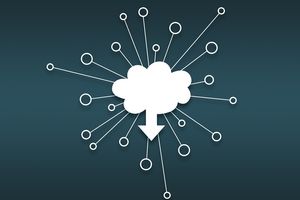Techwave’s SAP S/4 HANA Insights, Shaping the Future of Technology, SAP Solutions, and Digital Transformation Trends

CXOToday has engaged in an exclusive interview with Mr. Raj Gummadapu, CEO, Techwave.
- Which sectors or categories of enterprises stand to gain the greatest advantages from the adoption of SAP S/4 HANA? Could you detail the essential features and advantages that SAP S/4 HANA brings to businesses?
In today’s digital age, any enterprise dealing with vast volumes of data and having process-intensive operations stands to benefit immensely from SAP S/4 HANA i.e., virtually every business in our modern era. Especially, sectors such as manufacturing, retail, finance, healthcare, and utilities have reaped significant benefits from this transformative platform.
The underlying architecture of HANA is tailored for modern business needs. Its simplified data model, built-in-memory computing and columnar storage aspects not only facilitate rapid data retrieval but also foster the creation of analytical insights. This is pivotal in an age where data-driven decision-making is the linchpin of successful enterprises.
SAP’s commitment to continuous innovation is evident in the S/4 HANA platform. Organizations that integrate this module into their operations are invariably positioned at the forefront of technological advancements, benefiting from the platform’s relentless evolution.
Moreover, in a world increasingly emphasizing sustainability, SAP S/4 HANA offers invaluable capabilities that extends to understanding the sustainability scores of every entity in the supply chain. With SAP, businesses can holistically view both organizational and supplier data, ensuring that their entire operational ecosystem aligns with sustainable practices.
In sum, SAP S/4 HANA is a strategic asset that empowers businesses to be agile, insightful, innovative, and sustainable.
- What are the common difficulties that organizations encounter during the migration or implementation of SAP S/4 HANA, and what strategies can they employ to surmount these challenges?
Migration to SAP S/4 HANA is a monumental task, and challenges often emerge from legacy systems and practices. Customizations in earlier ERP platforms even if it was SAP, they may not align with S/4 HANA’s capabilities. Often, custom codes tailored for legacy systems might already exist in an improved form in S/4 HANA, leading to redundancy and eventually technical debt. The ideal approach is to discard redundant custom codes, align with standard industry-specific processes, and adapt the organization to this unified platform. Following industry best practices is pivotal in some cases.
Additionally, years of data accumulation can pose challenges during migration. Decisions on data retention and its relevance are crucial. This decision not only influences the migration duration but also its overall effectiveness. Best practices recommend a phased migration approach to mitigate business disruption, with data migration as the concluding step. This process should be meticulous: data must be analyzed, cleaned, validated, and imported in manageable batches, ensuring any issues are swiftly addressed.
Change management and continuously educating the team can play vital roles in ensuring a smooth transition. By strategically approaching migration, businesses can fully harness the capabilities of SAP S/4 HANA, reaping long-term benefits.
- What considerations should organizations keep in mind when it comes to training and upskilling their workforce to effectively use SAP S/4HANA after migration?
The implementation or migration to SAP S/4 HANA to an organization is more than just a system change; it’s a transformative shift in how businesses operate. So, investing in comprehensive training programs tailored to various user roles is crucial. This involves both technical training for IT teams and functional training for business users.
A standout feature of S/4 HANA is its exceptional user experience, primarily driven by Fiori-based applications. While intuitive, it necessitates training for teams to become proficient.
Data plays a pivotal role in the S/4 HANA ecosystem. Ensuring well-maintained and harmonized data across systems accelerates processes and optimizes outcomes. An emphasis on organization-wide data literacy is crucial. With S/4 HANA’s integrated analytical capabilities, many tasks traditionally performed on platforms like MS Excel can be significantly enhanced. To transition to insight-driven decision-making, teams should be trained to leverage these advanced data visualization and analytical tools.
However, upskilling shouldn’t be rushed. A hasty approach can diminish adoption rates. Leaders must allocate sufficient time for comprehensive training, fostering a culture where both the workforce and leadership embrace the transformation journey. It’s also vital to note that training shouldn’t be the last step in the migration process. Integrating training early ensures that teams are well-prepared, facilitating a smoother and more successful transition.
- How does Techwave address data security, compliance, and data privacy concerns in its SAP solutions and services?
With a significant portion of the workforce operating online and virtually, safeguarding data is more critical than ever. Restricting data access based on a need-to-know criterion ensures that employees access only the information essential for their roles, minimizing potential security vulnerabilities.
Techwave recognizes these modern-day challenges and has instituted robust data security policies. These policies are meticulously crafted to protect both organizational and intellectual data of all our clients and partners. Leveraging our CMMI and ISO certifications, we implement stringent security protocols, conduct regular audits, and ensure adherence to global compliance standards. Furthermore, Techwave operates within the ambit of global and regional compliance laws, adhering to stringent standards such as SOX compliance and GDPR compliance.
Techwave’s commitment to excellence is further fortified by SAP’s state-of-the-art governance and risk management tools. They not only monitor but also provide analytical insights into data usage patterns, offering a comprehensive view of data interactions.
Following a multi-layered approach, we employ trusted third-party tools to further enhance our capabilities in role management, data security, and access privilege maintenance. This holistic strategy ensures that every piece of data, every transaction, and every interaction is secure, allowing our clients and partners to operate with confidence.
- What is Techwave’s perspective on the future of technology and SAP solutions, and what emerging trends or innovations do you foresee in the digital transformation landscape?
At the forefront of the current phase of technological evolution is the increasing adoption of AI, particularly Generative AI. Our client partners frequently express their curiosity about the potential of generative AI and its role in transforming their businesses. Machine Learning, another pivotal technology, is enhancing predictive analysis capabilities, enabling businesses to forecast trends and make informed decisions.
Process automation, especially for repetitive and mundane tasks, is witnessing advancements, liberating human resources to focus on more strategic initiatives. The business model is also experiencing a shift, transitioning from a capital expenditure (CapEx) model to an operational expenditure (OpEx) model, offering more flexibility and adaptability.
In the realm of cybersecurity, data security, and compliance management, we anticipate groundbreaking advancements, further fortifying the digital defenses of organizations. Sustainability will also become a central business tenet. As companies pursue their ESG goals with the same vigor as their bottom-line objectives, the emphasis on carbon neutralization will intensify.
The rise of low-code and no-code platforms signifies a democratization of app development. The SAP ecosystem, cognizant of these shifts, is evolving to cater to these demands. Its introduction of unified platforms like BTP (Business Technology Platform) exemplifies this, offering a holistic solution encompassing app development, data management, analytics, and process automation.
The era of Big Data is ushering in a paradigm where insights and data-driven decisions are paramount. Sifting through vast data volumes to extract meaningful, actionable information will become streamlined, and the role of data scientists will become commonplace in average IT teams. Lastly, user experience will be vital, with design thinking becoming an organizational standard.
In conclusion, as we gaze into the future of technology and SAP solutions, we see a tapestry of innovations, integrations, and transformations. Techwave, in sync with these trends and in partnership with platforms like SAP, is committed to guiding businesses into this promising future, ensuring they are always at the cutting edge of innovation.
- How does Techwave envision its role in helping businesses become intelligent enterprises, and what benefits can clients expect from this journey?
In the quest to create Intelligent Enterprises, goes beyond the adoption of advanced technologies. The readiness of organizations to fully integrate these technologies into their core business strategies and day-to-day operations matters. For businesses to evolve, they must transition to a data-driven mindset, propelling them towards operational excellence and fostering innovation.
Regardless of whether an enterprise chooses to go for a complete transformation or a phased approach, Techwave, with its vast expertise, stands by them, steering them towards becoming intelligent entities. Beyond implementation our role starts with understanding an organization’s goals, recognizing its strengths and weaknesses, and meticulously prioritizing transformational objectives. With cross-industry expertise, we’re equipped to discern actions that yield long-term benefits from those that generate immediate results. High-impact areas like revenue channels, employee productivity, supply chain optimization, and system resilience lie at the heart of our transformational strategy.
Three pillars underpin business transformation: Technology, People, and Process. Techwave prides itself on possessing profound knowledge and experience in all three domains. Consider the turbulent times during the pandemic when traditional supply chain systems faltered. Techwave rose to the challenge, employing technology to optimize supply chains, enhance supplier relations, reduce lead times, and bolster inventory holding capacity. Such endeavors not only ensured supply chain optimization but significantly reduced operational costs for our clients.
Our approach is multifaceted: we identify challenges, propose solutions, and then adapt technologies and processes to augment human efforts. Ultimately, every business aspires to enlarge its market and wallet share. Both cost savings through operational optimization as well as creation of new revenue streams through novel channels necessitates agility. Techwave champions this cause, consistently delivering unparalleled value to our client partners, guiding them towards a future of unbounded potential.
Techwave envisions its role as a catalyst in helping businesses transition into intelligent enterprises. By leveraging our SAP expertise and broader IT capabilities, we enable businesses to harness the power of data, analytics, and automation. Our clients can expect streamlined operations, enhanced customer experiences, and a competitive edge in their respective markets. Our commitment to innovation, coupled with our global presence, makes us the ideal partner for businesses embarking on this transformative journey.



